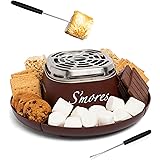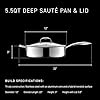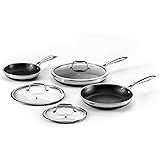Nostalgia Tabletop Indoor Electric S'mores Maker - Smores Kit With Marshmallow Roasting Sticks and 4 Trays for Graham Crackers, Chocolate, and Marshmallows - Movie Night Supplies - Brown
$29.98 (as of December 7, 2025 11:06 GMT -05:00 - More infoProduct prices and availability are accurate as of the date/time indicated and are subject to change. Any price and availability information displayed on [relevant Amazon Site(s), as applicable] at the time of purchase will apply to the purchase of this product.)HexClad Hybrid Nonstick 5.5-Quart Deep Sauté Pan with Tempered Glass Lid, Stay-Cool Handle, Dishwasher-Friendly, Oven-Safe Up to 900°F, Induction Ready, Compatible with All Cooktops
9% OffHexClad Hybrid Nonstick 6-Piece Fry Pan Set, 8, 10, and 12-Inch Frying Pans with Tempered Glass Lids, Stay-Cool Handles, Dishwasher-Friendly, Induction Ready, Compatible with All Cooktops
20% OffMaterial Composition
Understanding Cookware Materials
When I first started cooking, I had no clue that the material of my cookware could impact my cooking experience significantly. However, after trying out various kinds, I’ve realized that materials like stainless steel, cast iron, and non-stick have vastly different properties. For instance, stainless steel is super durable and doesn’t react with acidic foods, while cast iron retains heat like a champ and can even go from stovetop to oven.
Moreover, non-stick cookware is a game changer for easy cleanup, but you have to be careful not to scratch it! I learned the hard way by using metal utensils on a non-stick surface. So, choosing the right material for your cooking style is crucial, especially if you’re passionate about certain dishes.
In essence, think about what you’re likely to cook. Are you into searing, sautéing, or baking? The material plays a pivotal role in the outcome of your culinary creations.
Heat Conductivity
The way cookware distributes heat can greatly affect your food. I remember when I first got a set of pans that claimed to be ‘quick heating’ but turned out to be less than stellar. It took me ages to realize that not all pans conduct heat evenly. Copper is known for its excellent heat conductivity but often needs a lining to make it safe for cooking.
Aluminum is lightweight and heats up quickly too, but it can warp and might not be great for high-heat cooking unless it’s anodized. Personally, I’ve found that heavy-bottom pans tend to provide the most even cooking experience. They prevent hotspots and burning, which is a huge plus when you’re trying to perfect that risotto!
So, when you’re picking cookware, don’t just look for pretty designs; focus on how it will conduct heat during your cooking adventures. Trust me, it makes a world of difference!
Durability and Longevity
No one wants to invest money in cookware that’s going to wear out quickly. I’ve had my fair share of pans that chipped, scratched, or degraded over time. Stainless steel is typically known for its durability, while non-stick varieties may require a little extra TLC to prolong their life. The key is knowing how to care for each material properly.
For example, I’ve learned to always hand wash my non-stick pans instead of tossing them in the dishwasher. This simple act has extended their life significantly. Furthermore, checking reviews on specific brands can provide insight into how well those pieces can withstand regular use.
Purchasing quality cookware might cost a bit more upfront, but it saves you money down the road when you don’t have to replace it every few years!
Ease of Use
User-Friendly Features
Let’s be real, not all cookware is created equal when it comes to ease of use. There are so many features I now look for that make my cooking experience smoother. For example, handles that stay cool to the touch while cooking are a must-have! I can’t tell you how many times I’ve had to awkwardly maneuver hot pans.
Also, pouring spouts and measuring markings are little details that can turn ordinary cookware into a fantastic kitchen companion. These features just make cooking and serving so much simpler, especially when I’m dealing with liquid-heavy recipes.
Your choice should support your cooking style, whether it’s firing up a quick dinner or preparing a feast for friends. Easy-to-use cookware makes cooking feel less like a chore and more like an enjoyable experience.
Compatibility with Heat Sources
Another thing I’ve learned is that not all cookware is compatible with all heat sources. For instance, if you have an induction cooktop, you need specific cookware that’s magnetically conductive. I remember the disappointment when I tried using my beloved non-stick skillet on it and it just wouldn’t heat up!
Conventional gas stoves offer more flexibility, so most cookware will work. However, if you’re into versatility and plan to experiment with different cooking techniques, make sure you check if the cookware you’re eyeing will perform well across various heat sources.
When I finally got cookware that was induction-compatible, it made my life so much easier. My cooking was faster and more efficient, so definitely give this aspect strong consideration during your shopping process.
Maintenance and Care
Last but not least, let’s talk about maintenance. Some cookware requires a bit more work to keep in tip-top shape than others. For instance, I’ve discovered that cast iron needs regular seasoning to maintain its non-stick properties and prevent rust. It’s a small time investment that can really pay off!
On the other hand, stainless steel can be a breeze to clean when you know how to tackle it—sometimes just a simple soak in warm soapy water does the trick. Learning about the right cleaning methods for my cookware has made cooking less stressful and more enjoyable.
When buying cookware, always factor in how much time and effort you’re willing to dedicate to caring for it. Getting cookware that fits your lifestyle will make you much happier in the long run.
Final Thoughts
Choosing the right cookware goes beyond looks; it’s an investment in your culinary happiness. I hope that by sharing these hidden features, you feel more empowered to make the best choices for your kitchen. Whether it’s about material, heat conductivity, or ease of use, knowing these aspects can truly enhance your cooking experiences.
FAQ
1. What cookware materials should I look for?
Stainless steel, cast iron, and non-stick are some of the best materials to consider. Each has unique properties that cater to different cooking styles.
2. How can I ensure my cookware will last?
Invest in quality brands, follow care instructions, and always use utensils that are appropriate for the material to avoid scratches.
3. Are non-stick pans good for all types of cooking?
Non-stick pans are great for low-fat cooking and easy cleanup, but they may not be ideal for high-heat applications.
4. Do I need special cookware for induction cooking?
Yes! Induction cooktops require cookware that is magnetic. Always check that your pots and pans are compatible with this type of heat source.
5. How do I care for cast iron cookware?
Cast iron needs to be seasoned regularly to maintain its non-stick surface and prevent rusting. Cleaning involves avoiding soap and drying it right after washing.














